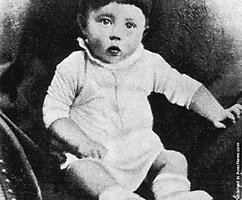Gary Chapman: the Key to language of love your child
 Bashny.Net
Bashny.Net
Does the concept of love languages to children? I often hear this question from students of their seminars on the family. My unqualified answer is Yes.
When children are small, you don't know their primary love language. So, try all five and you will definitely get to the goal. But if you observe their behavior, pretty soon you will learn what their primary love language.

Bobby six years. When his father comes home from work, Bobby jumps to his knees and begins to ruffle his hair. What Bobby says to his father? "I want to touch me". He touches his father because he wants to touch him. Most likely, the main language of love Bobby is the language of "physical touch".
Patrick lives next door to Bobby. He is five and a half. They often play together. However, Patrick's father, returning home, sees a completely different picture. Patrick excitedly shouted: "dad, Dad, come here — I want something to show you." My father said: "Wait a minute, Patrick. I want to read a newspaper".
Patrick leaves it alone, but within fifteen seconds he's back, near his father: "Dad, let's go to my room. I now want to show this to you, dad. I want you now look". His father replies: "Now, son. As soon as I finish here".
Mom called Patrick, and he disappears. Mom tells him that dad was tired and so he gave him a few minutes to read the paper. Patrick says "But mom, I want to show him what I did." "I know mom, but if dad thinks a few minutes."
Sixty seconds and Patrick back with the father. This time, he doesn't say a word, and with a laugh, jumping directly to his father for a newspaper. The father says, "Patrick, what are you doing?" "I want you to come in my room,' says Patrick. I want to show you what I did."
That requires Patrick?"Quality time". He wants the undivided attention of his father, and he becomes until, until you receive it, even if it will have to cause a scene.
The child thinks, "if I give a gift, then the parents will also give me a gift, if I touch it, then to me, too, touches"; the motivation for his behavior are his own emotional desires.
Perhaps on the basis of his experience he knows that when he does or says certain things, it usually gets corresponding to a certain reaction on the part of parents. Thus, he says or does something that will eventually lead to the satisfaction of his emotional needs.
You have not seen it all around you? The teenager ran away from home. His parents wring their hands, asking: "What could you do with us after all we done for him?" As a teenager sitting in the police station, sixty miles from home and says: "My parents don't like me. They have never loved me. They love my brother and not me." Whether the parents of a teenager like him? In most cases, Yes. Then what is the problem? Most likely, his parents never learned to Express love to your child in understandable language.
Perhaps in order to Express their love, they bought him a baseball MITT and a Bicycle, and the child cried out: "will Someone play with me? Someone will go with me to ride?"
The difference between buying a baseball glove and a baseball game with your child can be the difference between an empty vessel full of love and. Parents are able to wholeheartedly love their children (most that is), but this is not enough. We must learn to speak the primary love language of our children if they want to satisfy their emotional needs for love.
5 love languages in the context of love for the childrenwords of encouragementUsually parents frequently use words of encouragement while the child is still small. Even when the child does not understand speech, parents say: "What a beautiful nose, what beautiful eyes, what curls" and so on.

When the child begins to crawl, we applaud his every move and expressed "words of support". When he starts walking and stands, holding one hand sakray sofa, we stand and say: "go, go, Go. Right, that's it. So, come on."
The child makes half a step and falls. And what are we talking about? We don't say "You stupid child. Are you not able to walk?" On the contrary: "Oh, well done!" And he rises and tries again.
Why, as a child gets older, our "words of support" become words of condemnation? As they grow up our child, we are more inclined to condemn him for his failures than praise for success.
For a child whose main language of love language is "words of support", our negativity, the criticism, the requirements be a terrible blow to his psyche.
Hundred thirty-five adults still continue to hear the words of condemnation given against them twenty years ago: "You're too fat, no one will ever ask you out". "You're not a student. You may be kicked out of school." "I can't believe you're so stupid." "You are irresponsible and never will do." Adults are fighting with their own self-esteem and feel unloved all his life, if their primary language is being abused in this way.
Quality timeQuality time is undivided attention given the child. For a small child to sit on the floor with him and roll the ball back to here. We are talking about playing with cars and dolls. We are talking about playing in the sandbox and building castles of sand about to enter his world, to do anything with him.
When you're an adult, you can get carried away by the computer. But your child lives in the children's world. And if you eventually want to spend it in the adult world, then you have to first go down to his level. As the child Matures, he develops new interests, and you, if you want to satisfy his needs, must enter them.
If he's interested in basketball, take interest in basketball, play basketball with him, go with him to basketball games.
If he was interested in playing piano, you might could take a few lessons or at least, listen with full attention to his playing during class.
When you give a child undivided attention, it means that he's important to you and that you are pleased to be with him.
Many adults, looking back on my childhood, I remember little of what was said to them parents, but remember that the parents did. One adult said: "I remember that my father never missed one of my games in school. I knew that he was interested in what I do." For this adult 'quality time' was extremely important expression of love.
If "quality time" is the primary love language of your child, and you speak this language, that is, the probability that he will allow you to spend quality time in the period of his adolescence.
If you do not give him quality time in the early years, it is likely that in adolescence will seek the attention of peers and away from parents, who at this time will crave to spend more time with their children.
The receipt of gifts , Many parents and grandparents are too addicted to the language of gifts. Indeed, a visit to the toy store suggests that parents consider the language of gifts — the only language of love. If parents have money, they tend to buy their children many toys. Many parents believe that this is the best way to show love.
Some parents are trying to do for his children that at the time failed their parents do for them. They buy their kids that dreamed about when they were kids. But if it is not the primary language of love of a child, the gifts can for him not to have virtually no value in emotional terms. Parents have good intentions, but their gifts they do not meet the emotional needs of their child.
If the gifts that you give, quickly set aside, if the child seldom says "thank you" if the child does not take care that you gave him, if he is not fascinated by them, then most likely the language of "receiving gifts" is not his primary language of love.
If, on the other hand, the child responds to you in gratitude, if he shows the gifts to others and says how good you are, I bought them for him if he puts them in the most prominent place in his room, wiping the dust from them, if often in a long time playing with them, then perhaps "receiving gifts" is his primary love language.
Acts of service While children are young, parents constantly make against them "acts of service". If they did not, then the child would have died.
Bathing, feeding and dressing up requires a lot of effort in the first years of a child's life. Then comes the turn of cooking, washing and Ironing. Then the wrapping up of school Lunches, taxi service, cooking lessons. All this is perceived by many children as something self-evident, but for some it's an expression of love for him.
Keep watch over your children. See how they Express their love to others. This is the key to their love language.
If your child often expresses gratitude for simple acts of service, that's the key, indicating that they are important to him emotionally. Your acts of service in the full sense are to him your love. When you help him do practical work in any subject, it means much more than a good rating. It means: "My parents love me." When you repair the bike, it means much more than bringing it into working condition. Your child leaves it with complete vessel. If the child offers you help in the work, that probably means that he understands by this expression of love and, most of all, "acts of service" is his main love language.
Physical touch has long been known that "physical touch" many children from the point debate of emotions. Studies show that children whom carry arms, often developed emotionally better than those children who are not.
Usually many parents take the little child in his arms, cradle him, kiss, cuddle and tell him all sorts of silly words. Long before the child begins to understand the meaning of the word love, he feelsthat he is loved. Hugs, kisses, holding hands — all of this sends the child a sense of love.
To embrace and kiss the teenager is not the same, hugging and kissing small child. Your teenager may resist that in the presence of their peers, but this does not mean that he is opposed to you touching it, especially if it is his primary love language.
If your child often comes to you, takes your hand, lightly pushing you, hugging your legs when you walk by the room, wants to wrestle with you — all this indicates that "physical touch" for it is of great importance.
Keep watch over your children. Look at how your children Express your love. This is the key to their love language.
Ignore their requests to you. In many cases their requests are directly related to their language of love.
PrimeSite what they are most receptive. Rather, it indicates their primary language of love.
If we want our children to feel loved, we must learn to speak the love language of our children.
I'm sure many parents deeply love their children. I'm also sure that thousands of parents failed to talk about love in the right language, and thousands of children in this country living with an empty emotional vessel.
I am sure that the origins of violations of children and adolescents are at the emptiness of their vessels emotional love.
Expressing love is never too late. If you have adult children, and you realize that haven't spoken to them in the language of love, why don't you tell them about it?
When family members begin to speak the primary language of love to each other, the emotional climate in the family is significantly improved.published
From the book Gary Chapman's "Five languages of love", photo © Bill Gekas
P. S. And remember, only by changing their consumption — together we change the world! ©
Source: /users/4
When children are small, you don't know their primary love language. So, try all five and you will definitely get to the goal. But if you observe their behavior, pretty soon you will learn what their primary love language.

Bobby six years. When his father comes home from work, Bobby jumps to his knees and begins to ruffle his hair. What Bobby says to his father? "I want to touch me". He touches his father because he wants to touch him. Most likely, the main language of love Bobby is the language of "physical touch".
Patrick lives next door to Bobby. He is five and a half. They often play together. However, Patrick's father, returning home, sees a completely different picture. Patrick excitedly shouted: "dad, Dad, come here — I want something to show you." My father said: "Wait a minute, Patrick. I want to read a newspaper".
Patrick leaves it alone, but within fifteen seconds he's back, near his father: "Dad, let's go to my room. I now want to show this to you, dad. I want you now look". His father replies: "Now, son. As soon as I finish here".
Mom called Patrick, and he disappears. Mom tells him that dad was tired and so he gave him a few minutes to read the paper. Patrick says "But mom, I want to show him what I did." "I know mom, but if dad thinks a few minutes."
Sixty seconds and Patrick back with the father. This time, he doesn't say a word, and with a laugh, jumping directly to his father for a newspaper. The father says, "Patrick, what are you doing?" "I want you to come in my room,' says Patrick. I want to show you what I did."
That requires Patrick?"Quality time". He wants the undivided attention of his father, and he becomes until, until you receive it, even if it will have to cause a scene.
- If your child often gives you gifts, wrapping them and handing them to you with a special glint in his eyes, probably, the primary language of your child — "the language of receiving gifts". It gives you, because he wants to.
- If you see that your son or your daughter is always trying to help his younger brother or sister, it probably means that his primary love language is "acts of service".
- If he or she is often telling you how great you look and how you are a good father or a good mother, and how good you are at your job, this is a pointer to the fact that his or her principal language of love are "words of support".
The child thinks, "if I give a gift, then the parents will also give me a gift, if I touch it, then to me, too, touches"; the motivation for his behavior are his own emotional desires.
Perhaps on the basis of his experience he knows that when he does or says certain things, it usually gets corresponding to a certain reaction on the part of parents. Thus, he says or does something that will eventually lead to the satisfaction of his emotional needs.
- If all goes well, and emotional needs of children are met, that they grow into responsible adults.
- But if emotional needs are not being met, they may violate generally accepted standards, expressing anger toward parents who did not satisfy their needs, and seeking love in inappropriate places.
You have not seen it all around you? The teenager ran away from home. His parents wring their hands, asking: "What could you do with us after all we done for him?" As a teenager sitting in the police station, sixty miles from home and says: "My parents don't like me. They have never loved me. They love my brother and not me." Whether the parents of a teenager like him? In most cases, Yes. Then what is the problem? Most likely, his parents never learned to Express love to your child in understandable language.
Perhaps in order to Express their love, they bought him a baseball MITT and a Bicycle, and the child cried out: "will Someone play with me? Someone will go with me to ride?"
The difference between buying a baseball glove and a baseball game with your child can be the difference between an empty vessel full of love and. Parents are able to wholeheartedly love their children (most that is), but this is not enough. We must learn to speak the primary love language of our children if they want to satisfy their emotional needs for love.
5 love languages in the context of love for the childrenwords of encouragementUsually parents frequently use words of encouragement while the child is still small. Even when the child does not understand speech, parents say: "What a beautiful nose, what beautiful eyes, what curls" and so on.

When the child begins to crawl, we applaud his every move and expressed "words of support". When he starts walking and stands, holding one hand sakray sofa, we stand and say: "go, go, Go. Right, that's it. So, come on."
The child makes half a step and falls. And what are we talking about? We don't say "You stupid child. Are you not able to walk?" On the contrary: "Oh, well done!" And he rises and tries again.
Why, as a child gets older, our "words of support" become words of condemnation? As they grow up our child, we are more inclined to condemn him for his failures than praise for success.
For a child whose main language of love language is "words of support", our negativity, the criticism, the requirements be a terrible blow to his psyche.
Hundred thirty-five adults still continue to hear the words of condemnation given against them twenty years ago: "You're too fat, no one will ever ask you out". "You're not a student. You may be kicked out of school." "I can't believe you're so stupid." "You are irresponsible and never will do." Adults are fighting with their own self-esteem and feel unloved all his life, if their primary language is being abused in this way.
Quality timeQuality time is undivided attention given the child. For a small child to sit on the floor with him and roll the ball back to here. We are talking about playing with cars and dolls. We are talking about playing in the sandbox and building castles of sand about to enter his world, to do anything with him.
When you're an adult, you can get carried away by the computer. But your child lives in the children's world. And if you eventually want to spend it in the adult world, then you have to first go down to his level. As the child Matures, he develops new interests, and you, if you want to satisfy his needs, must enter them.
If he's interested in basketball, take interest in basketball, play basketball with him, go with him to basketball games.
If he was interested in playing piano, you might could take a few lessons or at least, listen with full attention to his playing during class.
When you give a child undivided attention, it means that he's important to you and that you are pleased to be with him.
Many adults, looking back on my childhood, I remember little of what was said to them parents, but remember that the parents did. One adult said: "I remember that my father never missed one of my games in school. I knew that he was interested in what I do." For this adult 'quality time' was extremely important expression of love.
If "quality time" is the primary love language of your child, and you speak this language, that is, the probability that he will allow you to spend quality time in the period of his adolescence.
If you do not give him quality time in the early years, it is likely that in adolescence will seek the attention of peers and away from parents, who at this time will crave to spend more time with their children.
The receipt of gifts , Many parents and grandparents are too addicted to the language of gifts. Indeed, a visit to the toy store suggests that parents consider the language of gifts — the only language of love. If parents have money, they tend to buy their children many toys. Many parents believe that this is the best way to show love.
Some parents are trying to do for his children that at the time failed their parents do for them. They buy their kids that dreamed about when they were kids. But if it is not the primary language of love of a child, the gifts can for him not to have virtually no value in emotional terms. Parents have good intentions, but their gifts they do not meet the emotional needs of their child.
If the gifts that you give, quickly set aside, if the child seldom says "thank you" if the child does not take care that you gave him, if he is not fascinated by them, then most likely the language of "receiving gifts" is not his primary language of love.
If, on the other hand, the child responds to you in gratitude, if he shows the gifts to others and says how good you are, I bought them for him if he puts them in the most prominent place in his room, wiping the dust from them, if often in a long time playing with them, then perhaps "receiving gifts" is his primary love language.
Acts of service While children are young, parents constantly make against them "acts of service". If they did not, then the child would have died.
Bathing, feeding and dressing up requires a lot of effort in the first years of a child's life. Then comes the turn of cooking, washing and Ironing. Then the wrapping up of school Lunches, taxi service, cooking lessons. All this is perceived by many children as something self-evident, but for some it's an expression of love for him.
Keep watch over your children. See how they Express their love to others. This is the key to their love language.
If your child often expresses gratitude for simple acts of service, that's the key, indicating that they are important to him emotionally. Your acts of service in the full sense are to him your love. When you help him do practical work in any subject, it means much more than a good rating. It means: "My parents love me." When you repair the bike, it means much more than bringing it into working condition. Your child leaves it with complete vessel. If the child offers you help in the work, that probably means that he understands by this expression of love and, most of all, "acts of service" is his main love language.
Physical touch has long been known that "physical touch" many children from the point debate of emotions. Studies show that children whom carry arms, often developed emotionally better than those children who are not.
Usually many parents take the little child in his arms, cradle him, kiss, cuddle and tell him all sorts of silly words. Long before the child begins to understand the meaning of the word love, he feelsthat he is loved. Hugs, kisses, holding hands — all of this sends the child a sense of love.
To embrace and kiss the teenager is not the same, hugging and kissing small child. Your teenager may resist that in the presence of their peers, but this does not mean that he is opposed to you touching it, especially if it is his primary love language.
If your child often comes to you, takes your hand, lightly pushing you, hugging your legs when you walk by the room, wants to wrestle with you — all this indicates that "physical touch" for it is of great importance.
Keep watch over your children. Look at how your children Express your love. This is the key to their love language.
Ignore their requests to you. In many cases their requests are directly related to their language of love.
PrimeSite what they are most receptive. Rather, it indicates their primary language of love.
If we want our children to feel loved, we must learn to speak the love language of our children.
I'm sure many parents deeply love their children. I'm also sure that thousands of parents failed to talk about love in the right language, and thousands of children in this country living with an empty emotional vessel.
I am sure that the origins of violations of children and adolescents are at the emptiness of their vessels emotional love.
Expressing love is never too late. If you have adult children, and you realize that haven't spoken to them in the language of love, why don't you tell them about it?
When family members begin to speak the primary language of love to each other, the emotional climate in the family is significantly improved.published
From the book Gary Chapman's "Five languages of love", photo © Bill Gekas
P. S. And remember, only by changing their consumption — together we change the world! ©
Source: /users/4
Tags
See also
Anatoly Neelov. Life is very short thing, and I choose to enjoy life and not to accumulate
What is the impact of lullabies on children and adults
Memo-manual-free-nakosyachili and nakasalalay educational life
If there is any doubt, to punish or not to punish the child, don't punish!
30 simple tricks to your child beamed with happiness
WHAT you don'T KNOW about your child's life on the Internet
How to embarrass a scientist: a psychologist, an economist and a physicist about what questions they are afraid
Mother to all, and she was one
What about when your child make comments on the street

















